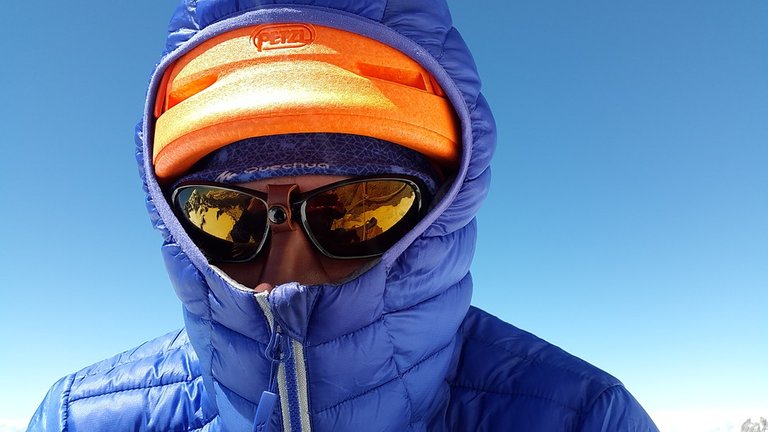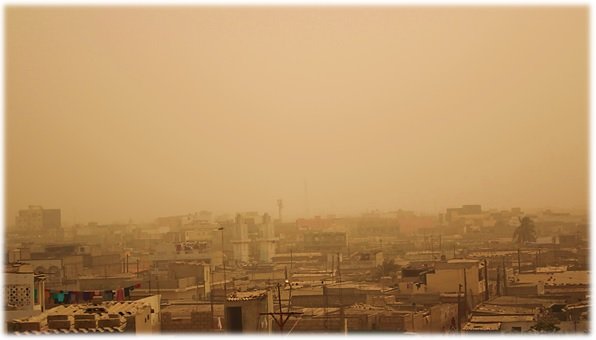Beginning from the end of November to the end of February, people living in West African countries have to deal with the harmattan. The harmattan, according to some scholars, derives its name from a word that means "tear your breath apart" in a West African language.
In the temperate and subpolar region of earth, there are four seasons in a year namely; Spring, Summer, Autumn and Winter but in the tropical and subtropical region where Nigeria is suited, there are only two seasons namely; Rainy and dry seasons.
The harmattan is a weather condition during the dry season. The harmattan is a dry but cold northeast wind that blows from the Sahara desert over the Gulf of Guinea during the dry season of the year.
Diseases associated with the harmattan
The harmattan is often associated with a lot of illnesses particularly airborne diseases. The following health hazards are usually prevalent during the harmattan viz:
Cold: It is unusually cold during harmattan, particularly very early in the morning and late at night. The temperature may drop as low as 9 degree Celsius in some part of Nigeria like Jos in Plateau State.
There is about 12 to 15 percent drop in humidity during this period. Exposed human surfaces such as the eyes, the skin, the mouth and respiratory tracks that interact directly with the atmosphere is seriously affected by the cold.
Symptom of cold include sneezing, sore throat, coughing, fever and runny nose.
The best way to brace up against the cold is to wear clothes that can keep one warm.
 Protection against cold clothing. Image is from Pixabay
Protection against cold clothing. Image is from Pixabay
Thus, it is an unusually tough time for homeless people who have nowhere to hide their heads at this time.
Dry Skin: The skin become dry and scaly as if it is cracking. The lips and sole of the feet are the most affected part of the body. This condition can be taken care of by using moisturizer and avoiding the use of harsh soap.
Dehydration: Due to loss of water from the body during this period, people usually feel dehydrated and need to take a lot of fluid to replenish the water lost from the body.
It is noteworthy that the harmattan is quite different from winter because it is characterized by wide fluctuations in day and night ambient temperatures as well as heavy dust-laden, cold-dry wind.
Catarrh: This is a condition that results from congestion of the nasal cavity with mucus. It can be prevented by taking vegetables and fruits in order to boost the immune system and ward off the infection.
Asthma: Asthmatic patients suffer a lot of attacks during this season because of the harmattan dust. It is advisable that asthmatic patient stay indoor and avoid exposure to dust and cold.
Disturbances associated with the harmattan
Besides the health hazards associated with the harmattan, it also causes other disturbances such as poor visibility and it increases fire outbreak.
Poor Visibility: The aviation industry usually suffer a lot of losses financially during harmattan because they have to cancel flight or sometimes divert them due to reduced or poor visibility. Poor visibility occur due to high concentration of dust particles in the air.
 Harmattan dust in DaKar, Senegal. Credit: EquipeTKNal
Harmattan dust in DaKar, Senegal. Credit: EquipeTKNal
Fire outbreak: The dry wind is usually a catalyst for fire outbreak during the harmattan. Therefore the National Emergency Management Agency (NEMA) usually initiate a campaign against indiscriminate bush burning and storing of fuel in shops overnight as a proactive step to prevent fire outbreak.
Other disturbances: The harmattan dust usually mess up every exposed surface including rooftops, cars, furniture, windowpane, vegetations which often wear the color of the dust particles that settle on them.
Concerns over low harmattan early this year
Early this year, some people expressed concerns over the low harmattan recorded in Nigeria. They feared that climate change may be responsible for the unusually weather condition observed in the country.
In Nigeria, it is usually cold in January, thanks to the harmattan. This year, however was different as many people were complaining of heat both during the day and at night at a time when they should be feeling chilly.
Experts warn of the danger that this weather changes pose both to human health and natural resources.
The late Kofi Annan- former UN Secretary-General was credited with this statement which I think is a good suggestion on the way out of the threat posed by climate change with respect to harmattan:
the evolving threat of the harmattan is a stark example of how we need to collaborate to protect public health from the effects of climate change. In the case of the harmattan, we need to make sure that accurate weather forecasts travel the “last mile” to reach people in the wind’s path so they can take shelter....the threat from the harmattan shows us a good place to start: by improving collection of climate and weather information, preparation of forecasts – including forecasts of dust and sand storms – and distribution of weather warnings to those who need them.
The Positive side of the harmattan
A severe harmattan foretold of a rich and good harvest for the farmer and some crop fair better during the the cold season as well.
Thank you for reading my blog.
References
Impact of Harmattan Season on Human Health in Keffi, Nasarawa State, Nigeria
A period of cold is important for the onset of flowering in many plants. This is why an adequate cold period is a prerequisite to having a bountiful harvest, especially fruits.
Also, many of us with AA blood genotype suffer a lot during this period. I am still battling with my own fair share of malaria. Do'nt also forget COVID19, the infection rate is usually high during this period.
Honestly speaking, I am just learning about the association of malaria with this season. Thanks for the enlightenment sir
Your content has been voted as a part of Encouragement program. Keep up the good work!
Use Ecency daily to boost your growth on platform!
Support Ecency
Vote for new Proposal
Delegate HP and earn more
Congratulations @saintgentle! You have completed the following achievement on the Hive blockchain and have been rewarded with new badge(s):
Your next target is to reach 4500 upvotes.
You can view your badges on your board and compare yourself to others in the Ranking
If you no longer want to receive notifications, reply to this comment with the word
STOPCheck out the last post from @hivebuzz:
Support the HiveBuzz project. Vote for our proposal!
It is interesting to read that you consider 9 degrees as something cold. Here, negative temperatures of minus a few degrees are what we call cold. In Quebec, this will be minus tens of degrees. Standards vary from one country to another... ;)
Thanks for this blog. I didn't know about harmattan. The second picture of the post looks scary...
I have often wonder what it will be like to experience negative temperature. For those of us in the tropics that will be a very scary experience.
Thanks for stopping by sir.
The coldest I experienced was -30/-40 Celsius in Canada (with the wind factor). This was damned cold ;)
Wow! I desire to have a taste of what -30/-40 degree Celsius feel like someday soon. I like adventure!
Thanks for your contribution to the STEMsocial community. Feel free to join us on discord to get to know the rest of us!
Please consider delegating to the @stemsocial account (85% of the curation rewards are returned).
Please consider including @stemsocial as a beneficiary to get a stronger support.
Taking measures to protect oneself against all the disease highlighted is just the best thing to do ...the diseases are there, we only have to guard ourselves against them.
Good write up, Weldone.
Thanks for the encouraging comment. You are right about taking preventive measures against the aforementioned diseases.
A fascinating article. I never heard of Harmattan Season before. I will be reading up on it and trying to understand more clearly the differences between that and winter. One significant difference seems to be dust, carried by the wind.
Thanks for the great article.
Thanks for your encouraging comment. Dust carried by the wind is indeed one significant difference between the harmattan and winter.
I was expecting you to mention malaria as one of the diseases associated with the harmattan but to no avail, I have been having malaria since the beginning of harmattan and I noticed it with my neighbors also, may be am wrong?
To be honest, I don't know that malaria is also associated with harmattan. I am learning that from you and @gentleshaid. Thanks for the comment and enlightenment sir.
Dear @saintgentle,
Do you mind supporting the HiveBuzz proposal for 2022 so our team can continue its work next year?
You can do it on Peakd, ecency, or using HiveSigner.
https://peakd.com/me/proposals/199
We wish you a Merry Christmas and a Happy New Year!